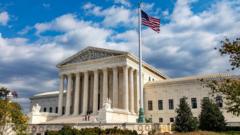Ronald Johnson, appointed by President Trump as ambassador to El Salvador, established a close relationship with President Nayib Bukele that some U.S. officials believe detracted from American efforts to combat gang violence and uphold justice within the region.
Discrepancies in U.S. Diplomacy: The Close Ties of Ambassador Ronald Johnson in El Salvador

Discrepancies in U.S. Diplomacy: The Close Ties of Ambassador Ronald Johnson in El Salvador
An examination of Ronald Johnson's controversial relationship with Salvadoran President Nayib Bukele raises questions about U.S. ambassadorial actions aligning with national interests.
Ronald Johnson's tenure as U.S. ambassador to El Salvador has sparked significant controversy, particularly regarding his close relationship with President Nayib Bukele. Nominated by President Trump in 2019, Johnson was brought on board following a declaration against El Salvador's notorious gangs, notably MS-13. However, instead of focusing on dismantling these criminal organizations, Johnson's actions appeared to prioritize the protection of Bukele.
From the onset of his appointment, Johnson and Bukele shared a social media presence characterized by family gatherings and public displays of camaraderie, signaling a bond that raised eyebrows among U.S. officials. Notably, even when Bukele faced allegations of colluding with local gangs, Johnson remained a staunch defender, dismissing congressional concerns regarding the accusations and even facilitating the early dismissal of an embassy staff member investigating potential governmental ties to gang activity.
This perceived favoritism toward the Salvadoran president reportedly conflicted with the broader objectives of the Trump administration, which aimed to strengthen measures against gang violence spilling over into the U.S. Attention has been drawn to how Johnson's focus appeared to shift away from addressing pressing issues related to crime and governance, favoring a personal rapport with a controversial foreign leader instead.
As discussions about the efficacy of U.S. diplomatic strategies continue, Johnson's case represents a critical examination of the balance between personal relationships and national interests in foreign policy.






















